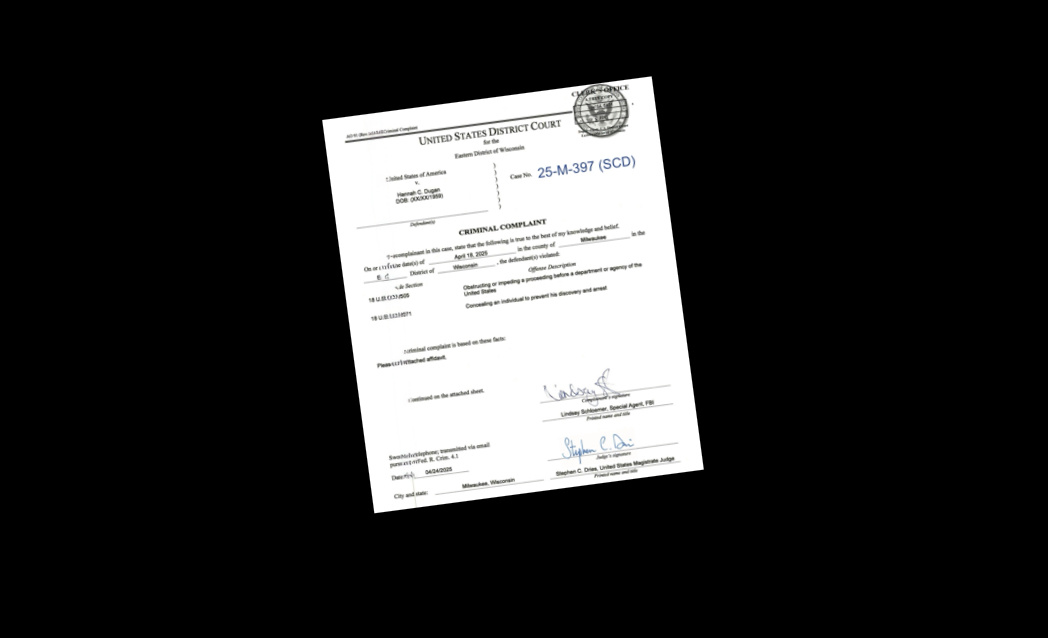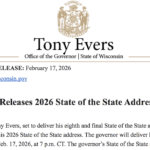April 25, 2025
MILWAUKEE — Milwaukee County Circuit Judge Hannah C. Dugan was arrested Friday morning on federal charges of obstructing a federal proceeding and concealing a person to prevent arrest. The charges stem from an April 18 incident in which she allegedly assisted an undocumented defendant in evading arrest by U.S. Immigration and Customs Enforcement (ICE) agents at the Milwaukee County Courthouse.
The charges stem from an April 18 incident in which Dugan allegedly took deliberate steps to prevent the arrest of Eduardo Flores-Ruiz, an undocumented immigrant facing criminal charges in her courtroom and subject to an active federal warrant.
Flores-Ruiz, 30, had been charged in March with three counts of domestic abuse-related battery in Milwaukee County. Federal immigration agents had confirmed his identity through fingerprint analysis and determined he had been previously deported in 2013 after being issued an expedited removal order. According to the complaint, there was no record of Flores-Ruiz seeking or obtaining lawful reentry into the United States.

On the morning of April 18, six federal agents from ICE, the FBI, DEA, and Customs and Border Protection entered the Milwaukee County Courthouse with a valid administrative warrant for Flores-Ruiz’s arrest. The plan, according to the affidavit, was to arrest him in the hallway outside of Courtroom 615 immediately following his court appearance before Judge Dugan.
Arrests in courthouse hallways, the complaint noted, are routine and considered safer for all parties involved, as individuals entering the building have already passed through security. “Members of the Milwaukee ICE ERO Task Force developed a plan to arrest Flores-Ruiz in a public area outside of Courtroom 615,” FBI Special Agent Lindsay Schloemer wrote in the affidavit.
This procedure was not unprecedented. The affidavit notes that at least two similar arrests in the public areas of the Milwaukee County Courthouse had previously taken place, though they had drawn public scrutiny. ICE maintained a policy—communicated to courthouse officials—that its agents were focused on apprehending defendants with pending criminal charges, not witnesses, victims, or parties to family or civil court proceedings.
A Judge’s Confrontation and Unusual Intervention
Witnesses described Judge Dugan as becoming visibly upset upon learning of the agents’ presence. An attorney with the Wisconsin State Public Defender’s Office—identified in the complaint as “Attorney A”—had photographed the agents and informed Dugan’s courtroom clerk of their presence.
According to the affidavit, Dugan “became visibly angry,” called the situation “absurd,” and left the bench to enter her chambers. Shortly thereafter, she and another judge approached the agents in the public hallway and challenged their right to be there.
Dugan allegedly questioned the agents aggressively, demanded to see their credentials, and insisted they needed a judicial warrant—not the administrative one they carried. She then ordered several agents to report to the office of the Chief Judge.
FBI agents and others complied, leaving DEA Agent B—the only officer not recognized by Dugan—positioned outside the courtroom. According to the affidavit, this agent later observed Dugan re-enter the courtroom and “appear to be looking for additional agents.”
Back in the courtroom, according to multiple witnesses, Dugan abruptly called Flores-Ruiz and his attorney forward. Despite the presence of victims and a prosecutor ready to proceed, she reportedly told them to follow her and led them through the courtroom’s “jury door,” a private exit typically reserved for court staff, jurors, or in-custody defendants.
According to a courtroom deputy, Dugan had previously made it clear that the jury box and its adjoining areas were off-limits to the public. “Only deputies, juries, court staff, and in-custody defendants being escorted by deputies used the back jury door,” the deputy stated.
An assistant district attorney who was present said the move was done with urgency and without notice to the prosecution. “Flores-Ruiz’s case had never been called,” she told investigators. “This happened without my knowledge or participation.”
Flight and Arrest
After Dugan escorted Flores-Ruiz and his attorney through the back door, agents stationed near the Chief Judge’s office spotted the pair in a different section of the courthouse. According to the complaint, they bypassed the nearest elevator bank and headed toward the building’s south elevators—a move that agents interpreted as an attempt to avoid detection.
DEA Agent A followed them into the elevator and alerted colleagues. Flores-Ruiz and his attorney exited on a lower floor and left through the courthouse’s Ninth Street entrance. Outside, agents confronted Flores-Ruiz, who fled on foot. He was ultimately apprehended near 10th and State Streets following a brief chase.
Dugan’s Legal Jeopardy
The FBI says Dugan’s actions directly interfered with the execution of a lawful arrest warrant and facilitated the escape of a subject who posed a flight risk. She now faces charges under Title 18 of the U.S. Code: obstruction of a federal proceeding (§1505) and harboring a fugitive to prevent arrest (§1071). Combined, the charges carry a potential penalty of up to 15 years in prison.
Judge Dugan was appointed to the bench in 2016 and has since been elected to her post. As of Friday, she had not made a public statement. A spokesperson for the Milwaukee County Circuit Court said it is “reviewing the matter closely.”
The Chief Judge, who was not present in the building during the events in question, reportedly told ICE during a phone call that he was working on a formal policy to guide where immigration enforcement actions can occur within the courthouse. According to the complaint, he confirmed that hallways are considered public spaces and did not object to the agents’ plan.
Flores-Ruiz remains in federal custody.
Judge Dugan was taken into custody by FBI agents at approximately 8:30 a.m. on April 25 and appeared before U.S. Magistrate Judge Stephen C. Dries later that morning. She was released on her own recognizance pending her next court appearance scheduled for May 15.
The arrest has sparked political anger among Dugan’s supporters. Wisconsin Governor Tony Evers criticized the federal action, noting that the Trump administration is using “dangerous rhetoric to attack and attempt to undermine our judiciary at every level.” U.S. Senator Tammy Baldwin called the arrest a “gravely serious and drastic move” that “threatens to breach” the separation of powers. Conversely, Republican lawmakers have defended the arrest, asserting that judges must not obstruct federal law enforcement efforts.
Updated 3:45p to include copy of the criminal complaint.














